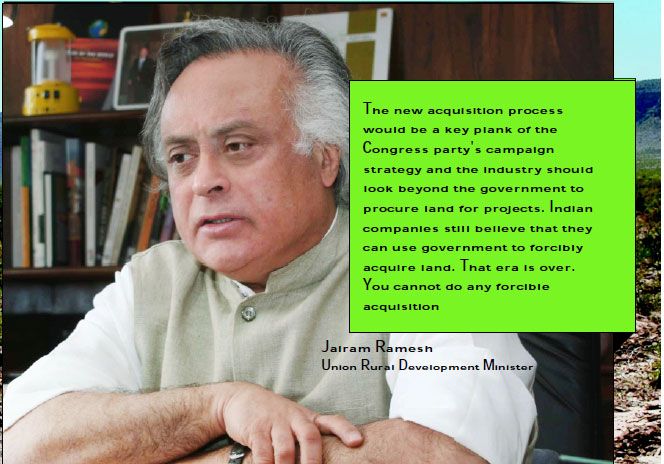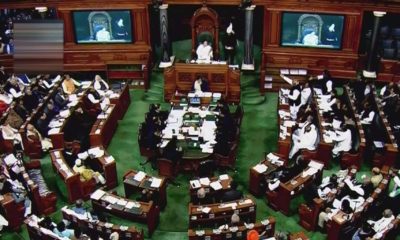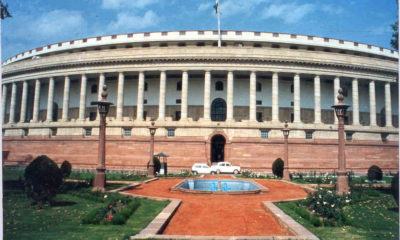Top Stories
Land Acquisition: Tough Promises




Passed recently in both the Lok Sabha Pand the Rajya Sabha, the debate over the ambitious Land Acquisition Bill, which now awaits just the Presidential assent to become a law, is yet to die down. While the ruling party promises more money by way of compensation for acquiring the land from farmers, the Opposition rants it as a mere ‘eyewash’ devised with the sole intent of garnering votes. Experts debate on the chequered implications of project. In some cases, this could make the overall project unviable and hurt capital expenditure. Second, rising land costs will have an overall inflationary impact on the economy. Third, the Bill will elongate the process of land acquisition,” said Sonal Varma, an analyst in Nomura Securities International Inc.
If passed, the law will make it mandatory for owners of rural land to be compensated with an amount four times the prevailing market value, while those in urban areas will have to be paid twice the market price. Moreover, the acquisition process also requires that 80 per cent of land owners give their consent before it can be handed over to private companies. Putting together, if private companies were to acquire land by the book with all the processes laid out by the law, it could take more than four years for them to get the land possession.
Besides upping land costs and extending the acquisition process, from the macro perspective, captains of Indian industry also feel that the Bill will serve to ‘de-industrialise’ India. “It is going to have a bad impact across the economy,” said Rajiv Kumar, a senior fellow at the Centre for Policy Research and former head of industry body FICCI. “From the timeline—which will lead to delays—to the consent requirements to the price of the land, this will just kill the business prospects and it will de-industrialise India,”Kumar said. Nor will the new Bill bring relief to tribals—the most vulnerable community as far as land acquisition is concerned—experts feel. A leading social scientist, who deals with the tribal communities on the same issue, said on condition of anonymity: “Looking at the present debate, it seems land acquisition per se is no longer contested. Rather, it has been compensation. What’s more, there is a pan- India generalisation of the relationship between the land and its owners”. “If a rich farmer of Uttar Pradesh or Haryana can become a template for drafting a policy on land acquisition and compensation for the country, it may again fail to address the problems of say, a tribal resident of Jharkhand who is in no way a reflection of a farmer in Greater Noida, Uttar Pradesh or Gurgaon,” he added.
While there is not much doubt that the ruling Congress is also eyeing electoral gains in tribal areas with the new land acquisition policy—the last time it held electoral sway in the tribal tracts was in the 1980s, rural development minister Jairam Ramesh had also admitted to the fact of tribal displacement sans adequate compensation. “It is a fact that many tribals have been displaced and they have not got proper compensation. They have not got rehabilitation and resettlement, particularly in the projects relating to mining of coal and irrigation projects,”the minister had said.
MARKET VALUE: PROS AND CONS
In recent years ‘market value’ has been the government’s parameter for giving compensation for the land acquired. This is precisely what the 

which invariably would be woefully low even under local market conditions.
A displaced tribal resident will get this paltry sum to buy land elsewhere where the price will be much higher and where there would not be many job opportunities other than to pursue urban daily-wage activity. Moreover, one cannot rule out the involvement of some middlemen in the
‘guesstimate activity’ out to earn easy money through commissions or bribes. The tribal communities suffer the most even when it comes to land-to-land compensation packages. According to the new land acquisition policy of Uttar Pradesh, people will get 16 per
cent of the ‘developed’ land back that can be resold. Can a similar formula be applied to any tribal areas? The answer is resounding ‘No’. The lands that the tribals get as compensation are located in faraway places which usually do not have the essential forest and water sources. Government compensation usually does not take care of these common property resources. Over a period of time, the government has recognised individual rights to land in tribal areas, ignoring the communal rights to resources. This is despite the numerous protective laws that intend to retain the traditional tribal communal ownership over resources.
With controversies raking up on the land acquisition issue, new land acquisition laws are the need of the hour. But at the same time, a harmony and balance has to be maintained between the needs and requirements of the stake holders, the farmers and the country’s industrial
needs. How much of the promise the proposed law delivers is a question that the times ahead will answer.


ANIL KUMAR SHARMA
President, CREDAI-NCR


SANJAY DUTT
Executive MD, South Asia
Cushman & Wakefield


estate companies. It will impact our company in a big way, only because of the delays that can be expected from such a process.
RK ARORA
Chairman and MD Supertech Ltd


-



 News3 weeks ago
News3 weeks agoKW Delhi 6 Mall Onboards New Brands
-



 News3 weeks ago
News3 weeks agoManasum Senior Living Launches IKIGAI GOA, A Senior Living Community in North Goa, in collaboration with Prescon Homes
-



 News2 weeks ago
News2 weeks agoGodrej Properties Sells Rs 3k cr+ Homes of Godrej Zenith, Gurugram, within 3 days
-



 News3 weeks ago
News3 weeks agoBridging India Divide: Top 5 Tier- 2 Cities to Focus On
-



 News3 weeks ago
News3 weeks agoCommercial Realty Gets Tech Savvy: Fast Construction, Enhanced Convenience
-



 News3 weeks ago
News3 weeks agoMultipoint Connection – A Definite Boon
-



 News2 weeks ago
News2 weeks agoRBI’s Status Quo on Key Policy Rates to Help Maintain the Real Estate Growth Momentum, Say Industry Stalwarts
-



 News3 weeks ago
News3 weeks agoSacred Cities See a Retail Boom as Spiritual Tourism Surge: CBRE Report




























